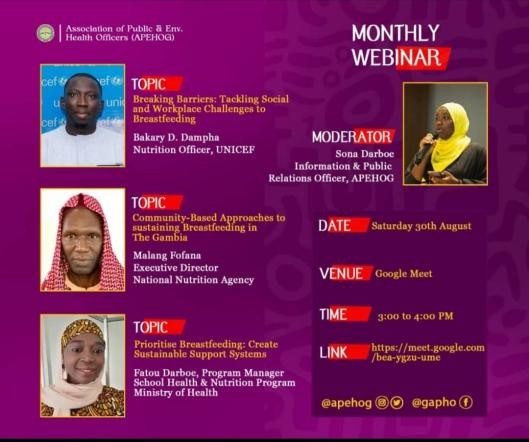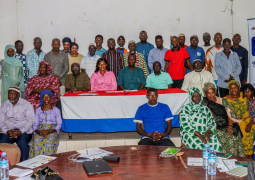
The monthly webinar, hosted by the Association of Public & Environmental Health Officers of The Gambia, brought together health professionals, policy advocates and development partners to discuss sustainable strategies for improving breastfeeding practices nationwide.
Alhagie Malang N. Fofana, Executive Director of the National Nutrition Agency (NaNA), underscored the importance of protecting and supporting lactating mothers to ensure effective and exclusive breastfeeding for the first six months of a child’s life.
“Breastfeeding is a cornerstone of child survival and development,” Fofana said. “To achieve exclusive six-month breastfeeding, we must create enabling environments, socially, legally and institutionally.”
He highlighted existing policies such as the National Nutrition Policy, Health Policy and Gender Policy, but stressed the need for a more robust legal framework to reinforce these efforts. He cited the Women’s Act, which grants six months maternity leave to mothers and ten days to fathers, as a foundational step towards sustainable, community-based breastfeeding support.
Fofana also advised expectant mothers to strategically use their annual leave prior to childbirth, allowing them to maximise their maternity leave for exclusive breastfeeding.
Fatou A. Darboe, Nutrition and School Health Programme Coordinator at the Ministry of Health, delivered a presentation outlining the objectives of World Breastfeeding Week and the theme for this year’s campaign. She emphasised the need to place breastfeeding at the heart of health, nutrition and development agendas.
“Prioritising breastfeeding strengthens health systems, supports optimal infant nutrition during the first 1,000 days, and reduces child morbidity and mortality,” Darboe explained. “It also protects maternal health, lowers household costs, and contributes to national economic growth.”
She called for the establishment of sustainable support systems across health, workplace, community and policy sectors to help mothers succeed in breastfeeding, while identifying gaps and challenges in the current landscape.
Bakary D. Dampha, Nutrition Officer at UNICEF, echoed the importance of breastfeeding for child survival, immunity, and cognitive development. He noted that despite its benefits, mothers continue to face significant barriers.
“Social stigma, misinformation, and cultural beliefs often discourage public breastfeeding,” Dampha said. “In the workplace, mothers struggle with insufficient maternity leave, lack of lactation spaces and rigid work schedules.”
To address these issues, he advocated for community education, male and family involvement, peer counselling, and the creation of workplace lactating rooms and flexible working hours.
The webinar concluded with a collective call to action: to strengthen policy implementation, raise awareness, and build inclusive support systems that empower mothers and promote breastfeeding as a national priority.
Read Other Articles In National News




